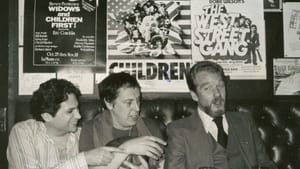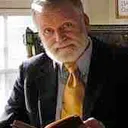Stay in the Loop
BSR publishes on a weekly schedule, with an email newsletter every Wednesday and Thursday morning. There’s no paywall, and subscribing is always free.
The other brick road
Robert Patrick reflects on 50 years of Off-Off-Broadway and gay theater

Robert Patrick was born into a poor migrant worker’s family in Texas in 1937. As a teenager, he wrote a novel about Tab Hunter and a screenplay for him and John Gielgud. In 1961, Patrick ended up in Greenwich Village's Caffe Cino, which turned out to be the first Off-Off-Broadway theater. Patrick stayed at the Cino until it closed in 1967, becoming a driving force in the OOB movement with over 300 productions of his plays in New York alone. In 1972, the Samuel French script company called Patrick New York's most-produced playwright.
Henrik Eger: Tell us about the first major gay plays in the U.S.
Robert Patrick: My play, The Haunted Host (1964), was preceded by Lanford Wilson's The Madness of Lady Bright by seven months at the Caffe Cino, although Lanford and I, who were roommates, were writing the two plays at the same time.
We were not consciously or programmatically creating gay theater. The freedom Joe Cino gave to playwrights just happened to give us the courage to write what was on our minds.
HE: What shaped you the most as a writer during those early days?
RP: I was already writing poetry day and night. I love wordplay, euphony and discord, the revelation of character, relationships, and inner life through what is said on the surface, and that eerie intersection of comedy and tragedy. I always tell directors that all my plays are musicals, and that whether the play is serious or humorous, their watchword to the actors should be, "Louder! Faster! Funnier!"
Even so serious a scene as that in my Judas, where Pontius Pilate tries to talk Jesus out of being crucified, is peppered with moments when paradoxes break the audience's tension with laughter.
The Caffe Cino writers en masse were influential on me as they made me realize it was possible to do as they did: go home, have a fantasy, write it down, bring it in, and get it up onstage for people to enjoy. But my tastes had been formed by my reading and moviegoing long before I found the Cino.
HE: Edward Albee wrote, "Years ago, there were many serious and daring individuals in Greenwich Village under 30, as well as young playwrights, myself included. It was a wild and vital time."
RP: The 1960s in New York were the greatest time and place in history to be young. Jobs were abundant, rents were cheap, we had all had our minds broadened by paperbacks, and most of us had had some time in college where, even if the curricula were narrow, the libraries offered self-education galore.
The Beats had paved the way, what I call "The Other Brick Road," and tens of thousands of us came tripping down it, determined to live freely, and express ourselves unstintingly. We were not very political by today's or the 1930s' standards. Our main crusade was emotional, intellectual, and sexual self-liberation.
HE: How did American theater critics treat you and your work after your breakthrough with Kennedy’s Children in London?
RP: The English critics twitted the New York critics for having failed to discover me. They had their revenge on Kennedy's Children. A Times interviewer confided to me that he had been ordered to make me look like an idiot. Tennessee Williams, trying to plug the play on talk shows, was told that he could not, but sneaked in a plug on one show anyway. No Broadway producer would so much as accept a script of a new play from me to read.
HE: One day in 1990, you were carrying a sofa down Second Avenue. It started to rain, the sofa became heavier and heavier, and no one came to help. At that moment, New York City, like the sofa, became too much to bear and you left for L.A. Do you regret that decision?
RP: The theater world I adored had largely vanished. My fame had dissipated, and my money had disappeared, because I foolishly divested myself of all my Samuel French plays — including Kennedy's Children — in 1980 to get out of a relationship with an agent whose mind was going. I was doing shows only so I could sleep in the lighting-booths of theaters. I was effectively a homeless beggar — though simultaneously I was getting honors for doing Blue Is for Boys (1983), the first play about gay teenagers.
HE: You once gave this powerful overview of the Off-Off-Broadway scene: “Never before in the history of the world had there been a theater with no repression. At the Caffe Cino, theater entered the modern era.” Do you see a similar spirit of renewal in the theater world in our own time?
RP: I've been lucky enough in L.A. to stumble into a wonderful world of gay performance artists whose activities are centered in Silver Lake. Their monumental productivity, creativity, audacity, and originality are very like the Cino.
Otherwise, most of what I see and hear is depressing. There are virtually no theaters which just give the kids a floor and say, "Do what you have to do," as Joe Cino and Ellen Stewart of La MaMa did. Most theaters are rentals; most shows are staged readings instead of productions. There's virtually no theater press here, and yet there seems no end of playwrights.
People here are always announcing yet another competition for stand-up cold readings of ten-minute plays. Sometimes, I think the ten-minute festivals are popular only because they allow a theater to say to the grant people, "See, we serviced 150 playwrights last year!"
HE: Given the many remarkable things that you’ve done in your life, is there anything you have not done, but would like to experience?
RP: True love. And I would like to have the money to build or buy a theater in L.A. with enough ground space that I could call it Robert Patrick’s Free Parking Theater, because in L.A., the theater would fill up for every performance, no matter what show was on, just because of the magic words "free parking." Then I could do whatever plays I liked.
For Gary L. Day's review of the current Quince production of Patrick's Haunted Host, click here.
Sign up for our newsletter
All of the week's new articles, all in one place. Sign up for the free weekly BSR newsletters, and don't miss a conversation.

 Henrik Eger
Henrik Eger